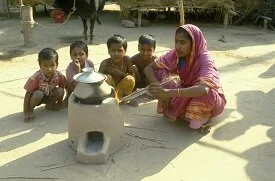NEW DATA COLLECTION MODULE TO IMPROVE UNDERSTANDING OF WOOD FUEL CONSUMPTION
This article has been shared by the R & B Timbers group from FAO Forestry.
FAO/Giampiero Diana 7 April 2017, Rome - Experts are finalizing a new data collection module that will help developing countries better understand their population's reliance on wood fuel for incomes and basic household needs this week in Rome.
Authorities from some 20 international organizations gathered at FAO headquarters to finalize a methodology to incorporate a questionnaire developed by FAO's Forestry Department into existing household surveys. This should help reveal the extent of rural households' dependency on woodfuel for needs such as cooking and heating as well as livelihoods, and help countries collect improved national statistics on the production and consumption of wood fuel.
Lesotho and Ecuador have volunteered to use the new module and questionnaire later this year in their surveys as a pilot project. The surveys will target small-scale, informal production and consumption of woodfuel at the household level.
Tsepiso Thabane, Chief Statistician in Environment and Energy Statistics within Lesotho's Bureau of Statistics, said it was crucial for Lesotho to be able to collect information to better understand the country's forest resources.
"Wood fuel plays a vital role in the lives of Lesotho -- especially in the rural areas -- because households there depend entirely on fuel wood for various purposes," Thabane said outside this week's meetings.
"They use it mainly for cooking, for heating the household and some (use it) - for lighting. So it is very crucial to have this data on fuel wood."
The questionnaire will mark the first time Lesotho has collected this type of data on its wood resources, she added.
"We use such data for (statistical) modelling of end-use (of wood)," said Thabane. "We also need it in order to compile national (statistics). It is very important to have such timely and reliable data."
It is expected that by improving their capacity to gather relevant statistics nationwide, policy-makers will be able to craft more effective evidence-based policies and interventions that will benefit the people who depend on forests for their lives and livelihoods. It is also hoped that the data will encourage greater private-sector participation and investment in woodfuel production and trade -- key to increasing the role of forests as a major source of renewable energy in a growing green and bio-economy.
Globally, wood fuel provides about 40 percent of renewable energy supplies - as much as solar, hydroelectric and wind power combined. Over two billion people are thought to depend on wood for cooking and heating, and it is an important source of income for many rural households. However, because wood is predominantly produced and traded in the informal economy, it is hard to capture and monitor in national statistics. Where data is available, it is often incomplete, and seriously underestimates the true contribution of wood to rural livelihoods and local economies.
This FAO initiative is a part of the Global Strategy to Improve Agricultural and Rural Statistics, which emerged in 2012 as a response to the declining quantity and quality of agricultural statistics. The strategy is also addressing the emerging data requirements surrounding the monitoring of the Sustainable Development Goals (SDGs), which is crucial to track progress on their fulfilment and to guide future decision making on agriculture, including forests and energy.

